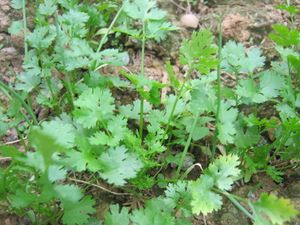Note: This is a project under development. The articles on this wiki are just being initiated and broadly incomplete. You can Help creating new pages.
Difference between revisions of "Coriandrum sativum - Dhanyaka"
Chaithrika (talk | contribs) (+Common names) |
Chaithrika (talk | contribs) (+Common names) |
||
| Line 19: | Line 19: | ||
* '''Hindi'''- Dhaniya | * '''Hindi'''- Dhaniya | ||
| + | ==External Link== | ||
| + | |||
| + | * [https://en.wikipedia.org/wiki/Coriander wikipedia] | ||
[Category:Herbs]] | [Category:Herbs]] | ||
Revision as of 17:06, 28 February 2017
Fruit, leaves, oil of coriander all have an important value in spices. Green freshly leaves are used to flavour and garnishing the food. Dry fruit is main ingredient in garam masala. Warm potency, unctuous, sweetish pungent, bitter in taste, remain sweetish after being digested. Its uses in global food preparation is only the tip of the iceberg. Unbeknownst to many people, coriander is packed with potential health benefits that most people completely miss when they toss this garnish into the garbage after eating their meal. It has eleven components of essential oils, six types of acids (including ascorbic acid, better known as vitamin-C), minerals and vitamins, each having a number of beneficial properties.
Health benefits of coriander
- Skin disorders: The disinfectant, detoxifying, antiseptic, antifungal and antioxidant properties of coriander are ideal for clearing up skin disorders such as eczema, dryness and fungal infections.
- Low cholesterol levels: Some of the acids present in coriander, like linoleic acid, oleic acid, palmitic acid, stearic acid and ascorbic acid (vitamin-C) are very effective in reducing the cholesterol levels in the blood. They also reduce the level of bad cholesterol (LDL) deposition along the inner walls of the arteries and veins, which can lead to serious cardiovascular issues like artherosclerosis, heart attacks, and strokes. More importantly, coriander helps to raise the levels of healthy cholesterol (HDL), which works as a preventative line of defense against a number of dangerous conditions.
- Diarrhea: Some of the components of essential oils found in coriander such as Borneol and Linalool, aid in digestion, proper functioning of the liver and bonding of bowels, while also helping to reduce diarrhea. It is also helpful in curing diarrhea caused by microbial and fungal action, since components like Cineole, Borneol, Limonene, Alpha-pinene & beta-phelandrene have antibacterial effects.
- Blood pressure: Consuming coriander has been shown to positively reduce blood pressure in many patients suffering from hypertension. The interaction of Calcium ions and cholinergic, a neurotransmitter in the peripheral and central nervous system, more commonly know as acetylcholine. The interaction of these two elements relaxes blood vessel tension, thereby reducing the chances of a number of cardiovascular conditions, including heart attacks and strokes.
- Mouth ulcers: Citronelol, a component of essential oils in coriander, is an excellent antiseptic. Additionally, other components have antimicrobial and healing effects which keep wounds and ulcers in the mouth from worsening. They help speed up the healing process of ulcers and also freshen breath. Although not in common use in mainstream products, coriander is often used as an antiseptic component of all-natural toothpastes. In fact, before the invention of toothpaste, people would chew on coriander seeds to reduce bad breath!
- Eye care: Coriander is loaded with antioxidants, vitamin-A, vitamin-C and minerals like phosphorous in its essential oils, which prevents vision disorders, macular degeneration and it reduces strain and stress on the eyes. There is also beta-carotene in the leaves, which prevent a number of other diseases that affect the eye, and can even reverse the effects of vision degradation in aging patients.
Common name
- English -Coriander
- kannada - ಕೊತ್ತಂಬರಿ ಸೊಪ್ಪು
- Hindi- Dhaniya
External Link
[Category:Herbs]]
